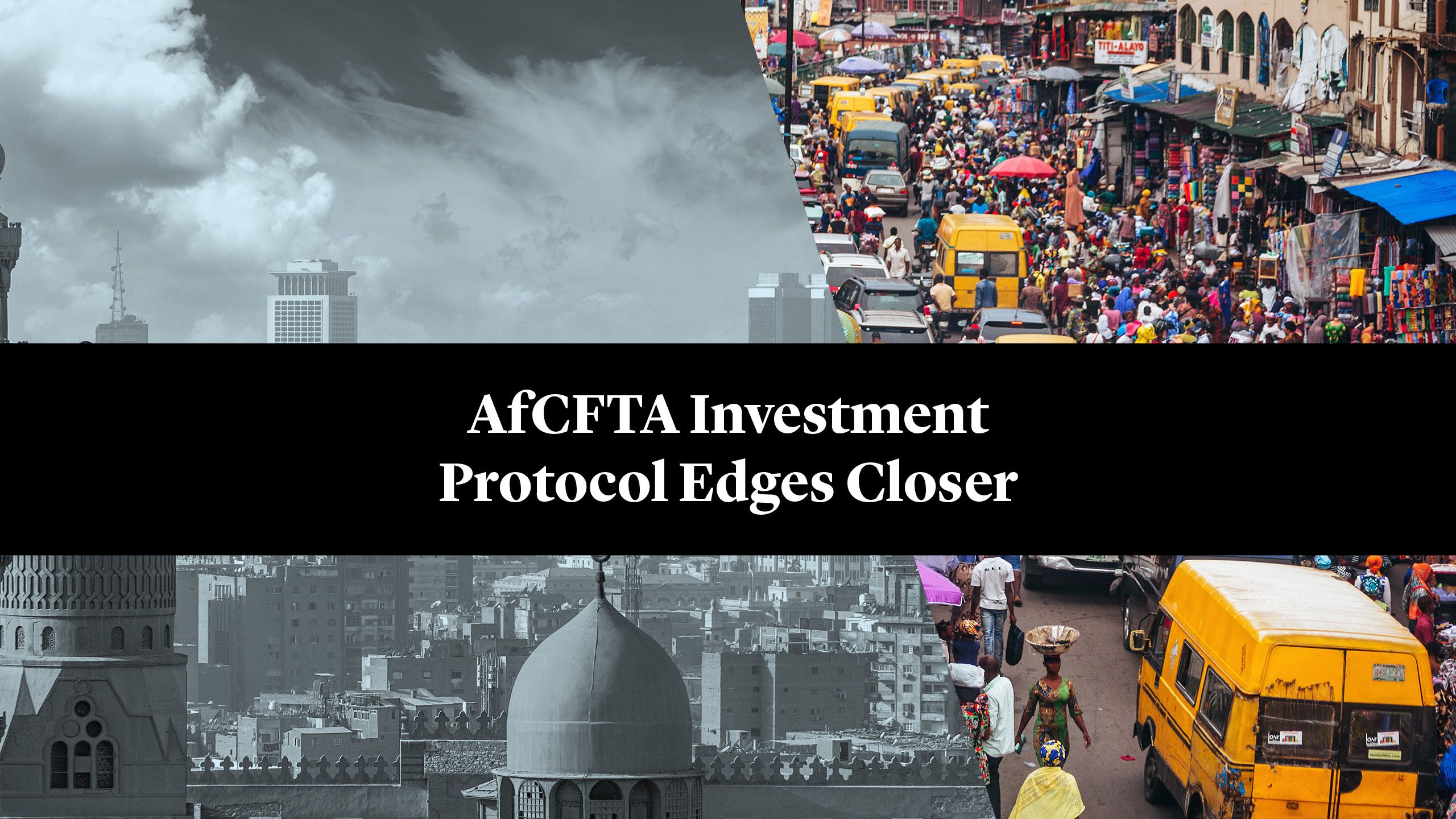
Three and a half years ago, the African Continental Free Trade Area (AfCFTA) Agreement (the “Agreement”) brought forth one of the largest common markets in the world.
The Agreement, which was negotiated under the auspices of the African Union and came into force on 30 May 2019, aims to increase trade and economic integration among the 54 signatory African states. Of those, 44 states have ratified the Agreement to date.
Background to the Investment Protocol
The AfCFTA negotiations were organized in two Phases: Phase I included the Agreement establishing the AfCFTA itself, as well as terms for trade in goods and services, along with a protocol on rules and procedures for the settlement of disputes, which includes a State-to-State dispute resolution system. Liberalized trading within the AfCFTA began, in principle, on 1 January 2021. In practice, implementation has so far been limited to a pilot involving eight countries and 96 products1.
Even as Phase I inches into reality, AfCFTA Member States have been negotiating Phase II. This addresses the Member States’ ambitions for deeper integration, beyond trade and tariffs. Article 8 of the AfCFTA Agreement commits members to “cooperate” on competition policy, intellectual property and investment protection. What any of this might involve was left for follow-up talks, originally due to conclude by June 2020.
Phase II negotiations thus include work on the terms of the protocol on investment protection (the “Investment Protocol”), which is to set continent-wide rules on rights and protections for cross-border investors. Once adopted, the Investment Protocol will form an integral part of the AfCFTA, as with the existing protocols on trade in goods and services.
Status of Negotiations of the Investment Protocol
Substantive negotiations on the Investment Protocol began in late 2021 and have run behind schedule, not least because of the COVID-19 pandemic. But they have now reached a preliminary conclusion.
On 28 October 2022, the AfCFTA Council of Ministers adopted a draft text at a meeting in Libreville, Gabon. The draft protocol will now be put before the AfCFTA Assembly, its highest decision-making body, reportedly in February 20232.
The Council of Ministers’ draft has not yet been published. This article looks instead at a ‘zero-draft’, published in November 2021 as the basis for the subsequent negotiations3.
Outline of the Draft Investment Protocol
The scope of the Protocol is the promotion and protection of intra-African investment. It will apply to citizens of, and companies incorporated in, state parties to the AfCFTA. It will not protect investments made by persons or entities with no connection to an African jurisdiction.
Like the AfCFTA as a whole, the Investment Protocol will not replace existing agreements struck by other African regional communities. Examples include the Southern African Development Community (SADC)’s Protocol on Finance and Investment (dated 2006, amended in 2016), the Economic Community of West African States (ECOWAS)’s Supplementary Act on Investment (dated 2008) and the Common Market for Eastern and Southern Africa (COMESA)’s Investment Agreement (dated 2007, revised in 2017). Article 5 of the zero-draft repeals all existing bilateral investment treaties between members, but not regional investment treaties, and rather commits members to make best endeavors to “review and revise” them. The coexistence of domestic investment statutes, regional investment treaties and the AfCFTA Investment Protocol may generate tension with the AfCFTA’s harmonization objective.
Substantive Protections and Obligations
Many recent investment treaties, in Africa and beyond, aim to balance investor rights with state interests. Ensuring that newly agreed investment treaty commitments do not unduly limit governments’ regulatory autonomy is also the policy position of the African Union, as reflected in its model investment treaty, the Draft Pan-African Investment Code4. The zero-draft reflects this approach.
In particular, Article 21 explicitly preserves the “right to regulate” of participating governments. Article 12 and Article 14 add that regulatory measures in pursuit of “legitimate public policy objectives” are not a breach of the rights to national treatment and most-favored-nation treatment respectively.
The zero-draft further expressly limits the scope of investors’ substantive rights. Article 15 for example clearly spells out that, while each state party shall ensure that protected investors and investments “are not subject to treatment which constitutes a fundamental denial of justice […], an evident denial of due process […] or manifest arbitrariness” in administrative or judicial proceedings (Article 15(1)), the scope of that protection “shall not be interpreted as equivalent to fair and equitable treatment” (Article 15(2)). The broad concept of “fair and equitable treatment” has indeed been criticized as being overly favorable to investors.
The zero-draft also suggests that the Investment Protocol will include other investors’ protections, phrased in a way that is typical in the new generation of investment treaties. This includes, for example, detailed national treatment and most-favored-nation rights, with the public policy exceptions mentioned above (Articles 11 to 14); physical protection and security provided by the host state (Article 16) and protection from unlawful expropriation, direct and indirect, again with public policy exceptions (Articles 16 to 18).
A third feature of ‘new generation’ investment treaties is imposing obligations on investors, as well as rights. Chapter 4 of the zero-draft lays out such obligations. Investors are for example to comply with national and international law (Article 28).
Substantive Protections and Obligations
Many recent investment treaties, in Africa and beyond, aim to balance investor rights with state interests. Ensuring that newly agreed investment treaty commitments do not unduly limit governments’ regulatory autonomy is also the policy position of the African Union, as reflected in its model investment treaty, the Draft Pan-African Investment Code4. The zero-draft reflects this approach.
In particular, Article 21 explicitly preserves the “right to regulate” of participating governments. Article 12 and Article 14 add that regulatory measures in pursuit of “legitimate public policy objectives” are not a breach of the rights to national treatment and most-favored-nation treatment respectively.
The zero-draft further expressly limits the scope of investors’ substantive rights. Article 15 for example clearly spells out that, while each state party shall ensure that protected investors and investments “are not subject to treatment which constitutes a fundamental denial of justice […], an evident denial of due process […] or manifest arbitrariness” in administrative or judicial proceedings (Article 15(1)), the scope of that protection “shall not be interpreted as equivalent to fair and equitable treatment” (Article 15(2)). The broad concept of “fair and equitable treatment” has indeed been criticized as being overly favorable to investors.
The zero-draft also suggests that the Investment Protocol will include other investors’ protections, phrased in a way that is typical in the new generation of investment treaties. This includes, for example, detailed national treatment and most-favored-nation rights, with the public policy exceptions mentioned above (Articles 11 to 14); physical protection and security provided by the host state (Article 16) and protection from unlawful expropriation, direct and indirect, again with public policy exceptions (Articles 16 to 18).
A third feature of ‘new generation’ investment treaties is imposing obligations on investors, as well as rights. Chapter 4 of the zero-draft lays out such obligations. Investors are for example to comply with national and international law (Article 28). More specifically, they are to:
- Comply with “standards of business ethics, human rights and labor standards”, including those set by the International Labor Organization (Article 30)
- Respect environmental standards, including mitigation of any environmental damage caused by their operations (Article 30(1))
- Follow best practices in corporate governance, including equitable treatment of minority shareholders and disclosure of material financial information (Article 35)
- Refrain from “exploit[ing] or us[ing] local natural resources to the detriment of the rights and interests of the host state and local communities” (Article 30(2))
- Refrain from interfering with the host state’s internal affairs (Article 32)
Investor-State Dispute Settlement
The Investment Protocol is likely to provide for disputes between an investor and the host state to be settled through international arbitration, although again in a manner reflecting the shifting balance between investment protection and state interests.
The zero-draft would allow investors to seek arbitration in a range of forums, under various arbitration rules, including arbitration administered by the AfCFTA Secretariat, or under the rules adopted by African regional institutions or dispute resolution centers, as well as the ICSID Convention, the UNCITRAL Arbitration Rules, or “under any other arbitration institution or […] arbitration rules” (Article 6).
While each state party consents to the submission of an investor’s claim to arbitration under Article 9(a), the zero-draft also expressly provides that, by submitting an arbitration claim against a state party, the investor consents to the arbitration of any counter-claims that the host state may bring in return for alleged breaches by the investor of its obligations under the Investment Protocol (Article 9(b)).
It remains to be seen whether the zero-draft’s dispute settlement provisions emerge intact from the negotiation process. The final Investment Protocol text will provide the answer.
Christopher P. Moore
Partner
London
T: +44 20 7614 2227
New York
T: +1 212 225 2836
cmoore@cgsh.com
V-Card
Laurie Achtouk‑Spivak
Partner
Paris
T: +33 1 40 74 68 00
lachtoukspivak@cgsh.com
V-Card
Naomi Tarawali
Partner
London
T: +44 20 7614 2304
ntarawali@cgsh.com
V-Card
Zeïneb Bouraoui
Associate
Paris
T: +33 1 40 74 68 00
zbouraoui@cgsh.com
V-Card





